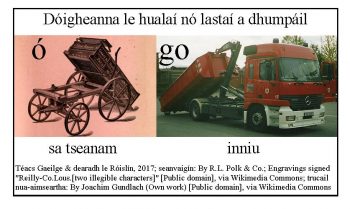Tag Archives: mac
Trucail Chrochta agus Trucailí Crochta: Another ‘Truck’ Term in Irish Posted by róislín on May 31, 2017

(le Róislín) Bhuel, I thought I was finished with dump trucks and the like when I came across one more related term in Irish, with a very interesting structure to boot — trucail chrochta, a tip-truck, which apparently is an Australian English word for a tipper or tipper lorry. A Astrálacha ar an liosta seo…
Agus An tAthbharr? (An Mhaidin Tar Éis Lá Fhéile Pádraig) Posted by róislín on Mar 20, 2011
(le Róislín) So, whether it was pionta Guinness or a glincín or an iar-dheoch, there might be some torthaí or iarmhairtí, especially if you had deoch amháin de bharraíocht. So you might want to know the Irish for “hangover” – it’s “póit.” If you’re lucky, it might simply be a mild tinneas cinn. On the…
Na hUimhreacha Pearsanta (ar leanúint) Posted by róislín on Jan 10, 2011
(le Róislín) Cailín? Chailín? Cailíní? Chailíní? Mac? Mhac? Mic? Mhic? So what’s all that about, and what does it have to do with the “personal numbers” in Irish? What you just read is a sequence of four different forms of the word for “girl” (cailín) and the word for “son” (mac). In each case, the…
Pronunciation tips for Mamó, Móraí, and Daideo (Grandma/Granny and Grandpa) Posted by róislín on Jun 5, 2009
(le Róislín) There have been numerous inquiries on how to pronounce these words, since the previous blogpost on this topic came out (nasc thíos), so here are some tips: To pronounce Mamó: the final vowel is long, so it gets extra emphasis: mam-OH To pronounce Móraí: the emphasis is on the first syllable, which sounds like…
An Cháisc (Easter) is a Cognate of … Pascha and Pesach Posted by róislín on Apr 12, 2009
(le Róislín) It may seem straightforward enough that Pascha (Latin for Easter) and Pesach (Passover) are linguistically related to each other. Several of the other Celtic words for Easter are also clearly connected, Y Pasg (Welsh), Pask (Cornish, Breton), as are the English adjective, Paschal, and the Romance words, Pâques, Pascua, and Pasqua. Their connection…



